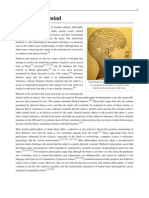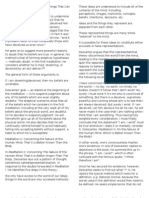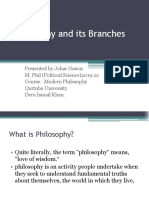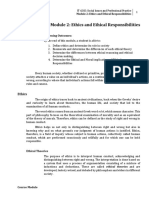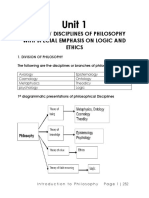Intro To Philosophy Notes
Intro To Philosophy Notes
Uploaded by
sweetchickxp1Copyright:
Available Formats
Intro To Philosophy Notes
Intro To Philosophy Notes
Uploaded by
sweetchickxp1Original Description:
Original Title
Copyright
Available Formats
Share this document
Did you find this document useful?
Is this content inappropriate?
Copyright:
Available Formats
Intro To Philosophy Notes
Intro To Philosophy Notes
Uploaded by
sweetchickxp1Copyright:
Available Formats
Intro to Philosophy
9/11/2013 5:33:00 AM
I. Why should you study philosophy? Rousseau: gain knowledge liberated from habitual beliefs; no more limitation we think about universe outside humans raise you from the physical world opens up more possibilities that you have not thought before draws distinction between philosophy and science personal self-reflection questioning morals where your values come from/where your general beliefs and moral come from Perry: knowing what you know and knowing what you dont know hits your beliefs now in college (practical)this is time to reflect who you are and where you come from Philosophy is a lot of thinking creatively A. How to study philosophy? Perry: it is not English reading- readings are a lot shorter but takes a long time because authors write intricate writing discuss unclarity in paper/assignment (?) put your position as an intelligent opponent assume other people were intelligent challenge the writer how you approach the writer II. Extracting arguments: arguments have a conclusion and one or more premises extracting arguments from whole paragraphs is the business of pulling out of the conclusion and the premises a lot of technical vocabulary (be clear); dont make it ambiguous i.e. God what does the writer mean God in an argument (What does writer argue?) Ask yourself: what is the main point the writer is trying to make? (What is the writer arguing for?) This is the conclusion.
trying to convince you Then ask yourself: what claims (reasons) does the writer offer in support of that conclusion? These are the premises. There might be only one premise; there might be a dozen or more There is often more than one correct way to extract an argument like this if you are argument doesnt make sense, look back Ask yourself: is there any technical or potentially confusing vocab? IF so, clarify it by putting it in your own words (paraphrasing in parenthesis) is your argument clear? Check your argument: look over your premises and conclusion. Have you left anything out? Have you included something that is not really part o the main argument? Have you represented the writers argument fairly (i.e. have you been charitable?) Is your argument clear (can some one follow it?) example: The Argument from Morality against Atheism Whats the conclusion? Atheism is wrong wrong- technically wrong or morally wrong? morally bankrupt to have moral, you have to believe in God ii. Atheism is false 1. argument is from morality against atheism 2. atheism is not the right theory iii. God Exists. b. Whats the premises? p.1: God is the ultimate moral authority p.2: without God, (its the ultimate moral authority) there cant be any objective moral truths p.3: we accept that there are objective moral truths Conclusion: Therefore, Atheism is wrong/God exists c. contradiction p1: Suppose atheism is true/God does not exist p.2: so, there is no ultimate moral authority p.3: there are no objective moral truths p.4: there are objective moral truths (killing children with no reason) p.3 and p.4 shows contradiction, thus, Atheism is wrong.
B. Extraction Exercises: Free Will: conclusion: free will is nonsense/illusion p1-no one has a choice about what he/she does p2- everything is determined by genes and upbringing POLLWEVERY: http://www.polleverywhere.com/bc1001
Philosophy of Religion
9/11/2013 5:33:00 AM
The Problem of Evil What God are we talking about? Omnipotent and benevolent God The God of western monotheistic religions not particularly Christian, Islam, or Jewish but what all of these gods have in common The Basic God o God exists o God created the universe o God is omnipotent o God is omniscient o God is benevolent o God loves his human creations o God is worthy of awe, reverence and prayer Parochial claims accepted by some religions but rejected by others: o Omnipotence: according to peter van limited by the bounds of logic o Christianity believe Jesus was the messiah while islam regards Him as a prophet o People believe in the power of Mary o Differing thoughts of afterlife Fundamental questions about religion: o Which claims are true? o Which of these claims should you believe? o Not all these claims can be true because they contradict each other o Cant be based on personal experiences and opinions but the truth must be sought out in regards to the world and in the context of the world o Which religions are true? o Which of these claims should we believe Conclusion of the problem of evil argument: God does not exist The basic form of the argument (Logical version): o P1. The existence of evil is incompatible with the existence of the Basic God o P2. Vast amounts of evil exists
o C. Therefore the Basic God does not exist o Because evil exists, God does not exist Hume reading: Do vast amounts of evil exist? Can we deny this? More detailed argument: o Evidence: earthquakes, child abuse, diseases, o P1. Evil exists o P2. God is omniscient, omnipotent, and perfectly benevolent o P3. If God is omnipotent, he could prevent the evil if he wanted to o P4. If God is omniscient, he knows the evil is occurring, and in fact has always known the evil would occur o P5. If Cod is benevolent, he wants there to be no evil o P6.So, the existence of evil is incompatible with the existence of the Basic God o C. God does not exist The existence of evil is incompatible with the existence of God Why do people think the conclusion follows? Why is the presence of evil incompatible with the existence of God? The presence of evil takes away the defining features of the Basic God Incompatible in this context: Both things [evil + God] cannot exist simultaneously; stronger connotation theres no possible way the God and evil could coexist; its logically incompatible; both claims cannot be true at the same time Evaluation the logical version of the problem of evil: o Evil is in the world because it build moral character? o God wants greater moral character and this desire outweighs the balance of evil tradeoffs of the existence of evil o Van Inwagen: It doesnt follow from wanting something to happen and being bale to do it that the agent in the question will act on it The agent in questions could have competing reasons that override or outweigh the desirability of what the agent wants Example of Alice: Alices mother is dying and in pain and she has the necessary means to end her mothers
suffering (euthanasia); conflicted morals are compromised, could end up in jail as a murderer just to end her mothers suffering for a few weeks Analogy as for why it doesnt follow that God is omnipotent/omniscient God may have an desire that an agenda that overweighs evil o Problem of evil argument (evidentiary version) P1. P2. P3. P4. P5. P6. The best explanation for the existence of vast amounts of evil is that there is no God C. Therefore God does not exist o Best Explanation argument: Inference to the best explanation inductive reasoning Two kinds of responses to the problem of evil argument: o A Defense- a demonstration that the existence of Evil/God are logically compatible o A Theodicy- claims to know/says exactly how evil fits into Gods plan for the world Reasonable defense (van Inwagen): At the very least, a defense will have to include the proposition that God was unable to bring about the greater good without allowing the evils we observe (or some other evils as bad or worse) p. 32 5 common defenses: o The idea that pain is necessary as part of the bodys warning system warn us of danger; but doesnt explain why bad things happen in the first place; imperfect system-pain may last after warning or we dont feel pain when something is wrong X o The idea that evil is necessary so that we may better appreciate the good we wouldnt have the concept of good if it werent for the evil that exist; with us understanding evil
we cannot understand the good; doesnt explain the vast amount of evil to appreciate the good; overkill o The idea that the evil is punishment for wrongdoing o The idea that evil is the result of human free will o The idea that evil is necessary of the development of moral character
9/11/2013 5:33:00 AM Recap: The Problem of Evil: Hard/impossible to reconcile the exisitene of a basic God with the existence of such vast amount of evil If God was omnipotent/omniscient he would allow evil to exist they should not/cannot exist Possible responses: o 2 types of responses Defense gives a reason why evil and God can coexist Theocracy actual reason why God would allow evil Van Inwagen: o A reasonable defense must be plausible o Must include proposition that God was unable to bring about the greater good without allowing the evils we observe Common defenses: o Pain is necessary of the bodys warning system o Evil is necessary so that we may better appreciate the good o Evil is the punishment for wrongdoing Good people can get punished too o Evil is the result of human free will Free will defense: free will is really good, humans can choose and this allows humans to be creative, to love, be free/ meaningful things without free will we would be robots Once we have free will, we have the option to do bad things murder, theft, rape, etc. PROBLEMS: Theres also natural evils: earthquakes, floods hurricanes, etc. not a result of free will can these things be considered evil? A reasonable person should see that free will does not outweigh the evils of the world the good does not outweigh the bad o Evil is necessary for the development of moral character Without evil there would be no challenges to overcome, no diseases to cure we wouldnt be as innovative or
as creative as compassionate, making connections with others, making the world a better place But do we need as much evils as we have? Is there no other way to bring about the good without this amount of evil? (van Inwagen) What is PVIs defense? o God created humans with free will but this allowed for evil to exist o Because we have free will, humans choose not to regard God and start to do evil things o Humans start to lose the powers God bestowed upon him o Love is a choice: God is unable to force anyone to love someone else o If God stops the evils, there would be no reason to get back to the union with God no motivation to seek out God o But if all the evils continue to happen and get worse, people will realize that they must reconcile with God and ask for his help o If people get back into the union with God there is an eternal happiness and the evils of the world is just a speck compared the eternal happiness you receive in union with God
o Does PVI believe this? o He believe parts of it because none of it is something he disbelieves Does he have to believe it? He doesnt have to believe it he just came up with a plausible/reasonable defense Does his meet his own criterion? o Its a defense
9/16/13 Pascals Wager: Two kinds of reasons for believing: o Reasons indicating that the belief is true o Reasons indicating that believing would be a good things for me to do regardless of whether it is true or false
Blaise Pascal: o French philosopher, mathematician, physicist, inventor, theologian, polemicist o Developed probability theory and decision theory o Decision theory: Example from gambling: Must calculate the value of each option: multiply the probability of each possible outcome by the value of the outcome ,then add the resulting numbers o Pascals Wager: Believing vs. not believing in God What God is Pascal talking about? God of all the religions the Basic God 2 possible bets believe in God bet that God exists Dont believe in God Bet that God doesnt exisit You have to take a bet you cannot abstain Which one should you take? BET 1: believe in God 2 possible outcomes: o God does not exist o God Exists If God does not exist, what do you lose? o According to Pascal: nothing If God exists? o Eternal life and salvation How do we apply probabilities in order to do the calculations? What is the probability that God exists? Let us make the as hard for the believer to believe: BET 2: Dont believe in God 2 possible outcomes: o God does not exist o God exist If God does not exist, you gain? o Being correct, freedom
If God exists, you lose: o Eternity eternal damnation Beleiving in God is the more rational and reasonable bet with a better expected utility either way Summary of Pascals Argument: P1. You have to either believe in God or not believe in God P2. Believing in God is the much better bet C. So, you should believe in God o Objections to Pascals Argument: Objection 1: Belief is not voluntary You cant force people into belief by proving that believing in God is he better bet Pascal: true you cant make yourself believe but you can do things that will lead you to believe; if you act like you believe, this will enable you to begin to believe Objections 2: Other Gods and other bets We have choice to believe in the basic God but there are other gods and other religions and we can relate this argument to these gods as well Pantheon of gods can run the utility calculations and bets can come in favor of believing in theses gods as well we can give parallel arguments/same arguments with other gods and other religions These gods can also conflict with each other some religions have doctrines that may contradict the calculations
Reasons to believe: Clifford vs. James
9/11/2013 5:33:00 AM
How does cliffordsWilliam Clifford (1845-1879): English mathematician/philosopher Story of the Ship owner o Ship owner has an aging ship and has doubt about it making a successful voyage but pushes his doubts aside and presses forward with voyage, everyone aboard dies o Didnt have a right to believe that ship would survive o Ship owner had no good evidence for the belief that the ship was seaworthy o It doe not matter that the ship owner sincerely believed the ship was safe o He is blameworthy for the deaths of the people aboard o Even if the ship did not sink, he is still guilty for believing without evidence has to do with the origin of the belief not whether it turned out to be right or wrong no sufficient evidence to support his claims Story of the religious island people o Point of the story: accusers had no sufficient evidence to support their accusations which could have easily been sought out and discovered o Even if the their accusations were found to be true, they are still guilty because the basis of the argument was formed with insufficient evidence o Acting upon these ill-formed accusations make these accusers guilty An objection: is it the belief that is wrong, or the action taken? o While it is true that having a belief is not the end of the story, you still have a choice on the course of action and it is impossible to separate belief from action o Once you hold a belief, it is impossible to decide what to do in a completely unbiased and fair manner you need more evidence to disprove your belief and change your mind o Beliefs you already have will affect future beliefs o A true belief will push the belief towards action on that belief even if the believer does not actually act on the belief
o Beliefs we hold influence what other beliefs we will accept or reject o So the ship owner and accusers were unethical, not only in their actions but in holding the belief the belief itself is part of what caused the men to drown or the religious people to be publically defamed The lessons of the ship-owner case and the religious people case extend to all cases of belief: o Their beliefs affects/had potential to affect other people negatively o We have a responsibility to get sufficient evidence to corroborate our beliefs because they can hold influence on other people o Believing on insufficient evidence leads people in general to be more blinding credulous leads to more bad beliefs and less looking for reason and evidence detriment to mankind Summary: o P1. The ship-owner was wrong to believe on insufficient evidence because his belief affected other people o P2. The accusers were wrong to believe on insufficient evidence because their beliefs affected other people o P3. Everybodys belief, always, everywhere affect other people o C. So it is wrong always, everywhere, and for everyone, to believe anything on insufficient evidence Deductive premise 3: based on the listed principles, you can only arrive at one conclusion How does Cliffords argument apply to Pascals Wager? o Clifford disagrees with Pascal its unethical for everyone, everywhere to form beliefs based on insufficient evidence What constitutes sufficient evidence? o According to Clifford, evidence that is 100% guaranteeing evidence, most of the time searching for reasonable evidence How does Cliffords argument apply to belief in God in general? o You need evidence, faith is not enough
William
o If there was good evidence that God does/doesnt exists, then he will believe/not believe in God James (1842-1910): American philosopher/psychologist Argues directly against Clifford o Unlike Clifford that gives us a universal thesis, he says that in certain instances, it is not irrational for ones belief to be determined by ones passional nature not by ones intellect but by feelings/emotions Definitions:
o Options: a choice between 2 hypothesis o Living option: one where both answers appeal to you as a real possibility o Forced option: One on which you cant avoid taking a position God debate o Momentous option: One that has a profound effect on your life scientific hypotheses o Genuine option: One which is living momentous and forced James vs. Clifford: James points to an important distinction: o Avoid error vs. believe in truths In regards to Cliffords position: James believes that Clifford emphasizes avoiding error by searching for sufficient evidence and if you cant then avoid believing in anything o James argues that believing in anything would be impossible if you are adamant about avoiding errors o By prioritizing truths, you can discover more truths with less error The Will to Believe o If an option meets two conditions, then it is not irrational to allow it to be settled by our passional nature what we want to be true or what would be good for us to believe o Those conditions are: The option is genuine
The issue at hand cannot be decided on intellectual grounds o Some things are good for us to believe best for us to believe what we want to be true o Belief in the fact leads to the fact Clifford disagrees does not make sense to believe in things that are not supported with evidence; irrational/immoral/unethical o Some cases of morality and what is best to pursue in life, etc. should be led by these principles Applying this Idea to God: o P1. If an issue cant be settled on intellectual grounds, it must be settled in some other way o P2. If it is a genuine option, it cant remain unsettled o The existence of God cant be settled on intellectual grounds and is a genuine option o P4. So it is not irrational to settle the question of God based on ones passional reasons o P5. Believing in God is a good things to believe: If Gd does not exist then Death ends all and much of the suffering and apparent injustice in the world is meaningless. The idea of such a universe fills James and others with despair and loathing o C. So, we should believe in God. In regards to Pascals argument: o James says that since we cannot dis/prove Gods existence intellectually, we should base out belief off passional reasons o Pascals argument could be applied to all religions and all gods existence of paganism and Christianity at once? o James argument is personalized can be applied to individual beliefs o James states genuine option as a necessity must be a real/plausible for the individual What may be a genuine option for others may not be for other people so people can pick and choose to not/believe
Must be a very real possibilities for you very subjective o Objection to James Argument: James has not shown that the issue of Gods existence cant be settled on intellectual ground Arguments for God: o Cosmological argument o Argument from design o The very definition of God in itself proves the existence of God
How to write a Philosophy Paper
9/11/2013 5:33:00 AM
Philosophy paper makes an argument throughout the whole paper There must be a clear thesis that is being defended Intro must state: I will defend that. Argument is a modest point Definitive vs. Subtle thesis white/black vs. grey No surprise endings Variety of original examples that support claims Develop an original objection Develop one or two ideas more deeply than introduce a variety of shallow ones Originality display independent thinking Be clear and direct show understanding and clarity Do not assume reader knows the relevant background the paper is for an audience and it should be assumed that they have no background info on the topic EXAMPLES Rachel Lim Philosophy Paper I Topic 3 William Clifford vs. William James Objective: compare and contrast both arguments and pick a side to defend, while developing original thoughts and examples Thesis: In this paper, I will defend that both arguments fail because you cannot solely rely on objective evidence or your passions to determine the validity of a belief. BP1: introduce cliffords arguments, including examples BP2: Introduce his stance in the God argument BP3: Counter examples and problems with his argument BP4: introduce James Argument, including examples BP5: introduce his stance in the God argument BP6: counter examples and problems with his claims
BP6: Explain why both are wrong and what is the correct stance Problem of Evil: Must explain van in wagens stance better by introducing it as a defense do you think its right? It is an equally plausible defense? Does it function like van in wagen wants it to function? Evidentiary vs. logical: very slight difference evidenciary more like physical tangible evidence that disproves the existence of evil best explanation of the premise that there is evil defense not a theodicy doesnt need to provide evidence as to why its true
Philosophy of the Mind: CARTESIAN DUALISM
5:33:00 AM
9/11/2013
Two central problems in the philosophy of mind:
1. The problem with other minds a. How can I know that other minds exist? b. How can I know what is going on in other minds? c. Heider-Simmel Demonstration: When we see actions, we naturally see motives and beliefs as being behind the actions i. makes the existence of other minds hard to believe how do we know that we dont see other people like the triangles/circles that perform empty actions with no motives and acknowledge the existence of their intentions/minds (Theory of mind) The Mind-Body Problem: a. How are minds and their contents related to the physical/chemical/biological world? i. There are 2 different facts about people/animals: physical facts (hair, height, etc) and mental facts (beliefs, intentions, dreams, etc.) ii. What is the relationship between the mind and all its contents and the physical world? iii. 2 apparent unique aspects of mental phenomena that make the mind-body problem so difficult: 1. Consciousness: theres something that makes you feel like you are you a. Hard to apply to inanimate objects 2. Intentionality (aboutness): if you are thinking about something, your thoughts are about that thing a. Difficult because you can explain through a causal effect/connection to explain thoughts but you can have lots of thoughts about things that dont exist or that you may not have encountered before that doesnt make sense
2.
b. Not about intentions; just to have something be about something else
Cartesian Dualism:
Rene Descartes (1596-1650) Mathematician, scientist, philosopher Basics: o Minds and bodies are fundamentall different kinds of substances (Substance Dualism)-> things that have qualities, not qualities themselves
Bodies are in space and time (Physical/material) Minds are in time, but not in space (non-physical, immaterial) Minds are capable of rationality, and intentionality, and thought, bodies are not 3 Arguments for Cartesian Dualism: ARGUMENT I: The Conceivability Argument o I can conceive of my body existing, just as it does not, without my mind going through the motions of living (zombie) o I can conceive of my mind existing, just as it does not, without my body o If two things can exist without each other, then they are distinct cant be identical o Therefore, my mind and body are distinct Not a valid argument because: I can conceive is omitted from the third premise; there is no mention of whether or not something is being conceived or stated Premise 3 should say, If I can conceive of it, then it is (logically possible), 4 should say, If two things can (logically) exist without each other, then they are distinct, and the conclusion should be Therefore my mind and body are distinct Good argument or not?
because the argument is based so much on conceivability that it is not a practical guide for possibility ARGUMENT II: The Fallibility Argument o 1. Knowledge of my body is fallible o 2. Knowledge of my mind is infallible o [If two things are identical, they share all properties (Leibnizs Law) (Not valid until this premise is inserted] o 3. Therefore, my mind and body are distinct 1. ARGUMENT III: Another properties Argument o 1. Factions about my body are publicly available o 2. Facts about my mind are private o 3. If two things are identical, they share all properties (Leibnizs Law) o 4. Therefore, my mind and body are distinct Are these arguments valid? Invalid? Unsound? o Cannot challenge this argument until you have proper reason/evidence to question the validity of the argument or have an alternative explanation
Princess Elisabeth (1618-1680) and her objection to Descartes There is a two-way casual interaction between mind and body Princess Elisabeths question to Descartes: how does the immaterial (non-physical) mind casually interact with the material (physical) body? Elisabeth: Immaterial/material causal interaction is mysterious. It is not like what we know of causal interaction. Causation requires physical contact or at least extension Descartes Reply: o Bodily movements and sensations are modes of the bod and mind together (and neither alone) o The comparison with heaviness: heaviness if a quality of a body that moves it towards the center of the earth; we do not think that this happens through contact of one surface with another Elisabeths Reply:
o Descartes theory of heaviness does more to convincer her that he needs a better explanation of how gravity works than illuminate anything on how an immaterial mind can act on a material body and vice versa o It would be easier for her to understand calling the mind a material, extended thing than to understand the two way causal interaction between material and immaterial substances Descartes Reply: o He says itll be better to understand the mind and the body as working together and to put it in terms necessary for her to understand. From that point, he says that there will be casual interaction but that a thought cant be extended in space because it doesnt preclude other things being the same place at the same time o He says that Elisabeth shouldnt concern herself with metaphysical matters o Descartes in the Passions of the Soul tries to further answer Elisabeths question about the nature of immaterial
Problems with Cartesian dualism how does the mind and the body interact? The Problem of Radical Emergence The problem in the womb o When does immaterial come into existence? The evolutionary problem o If humans were to have evolved from primitive species, it is unclear when the immaterial mind emerged The Problem of Other Minds Cartesian dualism makes the problem of other minds very hard to solve o How do we know that other minds exist and what goes on in them? o Cartesian theater
Behaviorism in the Philosophy of Mind
9/11/2013 5:33:00 AM
Materialism: The claim that everything in the universe is made up of matter AKA Physicalism, i.e. the claim that everything in the universe is physical Advances in physiology, biology, genetics, etc. that led to these conclusions life forces are not needed and everything can be explained in terms of physical matter Behaviorism The first modern materialist theory of mental facts Philosophical Behaviorism is a theory about mental states (a theory about what statements of mental facts mean) Philsophical behavirosits include: Rudolf Carnap (1891-1970) and Gilbert Ryle (1900-1976) Psychological behaviorism is the view that psychology should only concern itself with the behavior of organisms; inner mental states play no explanatory role in psychology Psychological behaviorist include BF Skinner (1904-1990) and John B. Watson (1958-1978) Scientists turned to behaviorism in order to be able to study physical behaviors and observe them According to behaviorists, claims about mental states can be translated into claims about patterns of behaviors, tendencies, and dispositions without loss of meanings o There is a verifiability you can translate claims about mental states without loss of meaning by observing these things o Making inferences and judgments based on what can be observed (disposition, patterns of behaviors, tendencies, etc.) o Dont confuse inner states with behaviors physiological description of the physical state deductive Ryle would say: knowledge of the mind is not infallible o We talk about other people and their minds all the time and this is unwarranted if Descartes was right we can deduct the state of peoples minds through observations of their behaviors Ryle on Category Mistake
Ryle thinks the Cartesian conception of the mind as a an immaterial substance (ghost in the machine commits a similar category mistake The mind is not a substance above and beyond all the behavior, dispositions, and tendencies, like the body is a substance that above and beyond the waling, talking, et, The mind just is the sum total of behaviors, dispositions, capacities, tendencies, etc. The mind is just a series of patterns of behaviors Advantages of Behaviorism: It doesnt face the problem of radical emergence o No immaterial mind in behaviorism It explains the mind/body interaction o There is no need for an explanation Appeals to objective, public facts o Behaviors are objective, public facts Offers a straightforward solution to the problem of other minds Problems with Behaviorism: I. Consciousness o It denies the data the first person subjective nature of mental life, independent of behavior II. Some mental states dont seem to be definable in this way III. People can lie and pretend o They can do so over an extended period of time, so much so that it becomes a disposition or tendency IV. For behaviorists, two people who behaved in just the same way would have the same mental states: o John Lockes inverted spectrum act in seemingly similar manners
You might also like
- Lesson Plan Multigrade 1&2Document30 pagesLesson Plan Multigrade 1&2Anonymous pN9oFMD185% (13)
- Lesson 1 Doing Philosophy PDFDocument19 pagesLesson 1 Doing Philosophy PDFAllysa Dela Justa TalentoNo ratings yet
- Philosophy of Mind - Descartes and HempelDocument5 pagesPhilosophy of Mind - Descartes and HempeljaboninNo ratings yet
- Moravcsik - The New LiberalismDocument12 pagesMoravcsik - The New LiberalismKeith DetrosNo ratings yet
- Sample Syllabus: Introduction To PhilosophyDocument5 pagesSample Syllabus: Introduction To PhilosophyJesse Butler100% (2)
- Making The GradeDocument4 pagesMaking The Gradejuancho1994No ratings yet
- Philosophy NotesDocument7 pagesPhilosophy NotesErin Leigh Marie SyNo ratings yet
- 3 Different Theories of TruthDocument2 pages3 Different Theories of TruthHadjie EstevesNo ratings yet
- Notes To Modern PhilosophyDocument95 pagesNotes To Modern PhilosophyjacobmohNo ratings yet
- PhilosophyDocument54 pagesPhilosophyAilyn AriasNo ratings yet
- Introduction To PhilosophyDocument22 pagesIntroduction To PhilosophyDebbie Marie BaisNo ratings yet
- Lecture 1 Introduction To Philosophy and Current IssuesDocument46 pagesLecture 1 Introduction To Philosophy and Current IssuesZixinNo ratings yet
- Philosophy of MindDocument17 pagesPhilosophy of Mindhemanthnaidu.d100% (1)
- Unit 1-Introduction To Philosophy-Lesson 1 - What Is PhilosophyDocument22 pagesUnit 1-Introduction To Philosophy-Lesson 1 - What Is Philosophyinsert generic username hereNo ratings yet
- Doing PhilosophyDocument1 pageDoing PhilosophyJeurdecel Laborada Castro - MartizanoNo ratings yet
- Ucu 111 103 NotesDocument47 pagesUcu 111 103 NotesMuigai MungaiNo ratings yet
- Reasons To Believe That The Ideas AccuratelyDocument6 pagesReasons To Believe That The Ideas Accuratelythomasfinley44No ratings yet
- Introduction To Philosophy Lesson 1Document18 pagesIntroduction To Philosophy Lesson 1Luzmerie Batulan100% (3)
- Introduction To Philosophy NotesDocument3 pagesIntroduction To Philosophy NotesMalkish Rajkumar0% (1)
- Instructor: Dr SC Kwan 關瑞至博士 Assistant Professor School of Humanities and Languages Email: Office: Rm 902, TKO Campus Tel: 3653-6732Document66 pagesInstructor: Dr SC Kwan 關瑞至博士 Assistant Professor School of Humanities and Languages Email: Office: Rm 902, TKO Campus Tel: 3653-6732Ching Tsz ShanNo ratings yet
- Modern PhilosophyDocument36 pagesModern PhilosophyDonna Oliit Ü100% (3)
- R.J. Hirst in His Book Philosophy': (Universally Accepted by All) Philosophy IsDocument3 pagesR.J. Hirst in His Book Philosophy': (Universally Accepted by All) Philosophy IsTasneem Noor MaishaNo ratings yet
- PhilosophyDocument5 pagesPhilosophyJane HembraNo ratings yet
- Uts ReviewerDocument6 pagesUts Reviewerhotdog killingNo ratings yet
- Lesson 1: Knowledge, Wisdom and Opinion OpinionDocument4 pagesLesson 1: Knowledge, Wisdom and Opinion OpinionDionela, Beatriz Felicity, SNo ratings yet
- Chapter 1 Introduction To PhilosophyDocument18 pagesChapter 1 Introduction To PhilosophyRoshan Jawad ZafirNo ratings yet
- Notes On UtilitarianismDocument24 pagesNotes On UtilitarianismounbblNo ratings yet
- Logic: Prepared By: Ruzanna Abdul ShukorDocument42 pagesLogic: Prepared By: Ruzanna Abdul ShukorSiang ElsonNo ratings yet
- 1.1philosophical Theories On The Self Intro Socrates Plato ST AugustineDocument46 pages1.1philosophical Theories On The Self Intro Socrates Plato ST AugustineArvin Rodriguez100% (1)
- Revised - Notes On Philosophy and LogicDocument7 pagesRevised - Notes On Philosophy and LogicLei GangawanNo ratings yet
- l1 Philosophy 130628222719 Phpapp02Document18 pagesl1 Philosophy 130628222719 Phpapp02RENALYN PUJADASNo ratings yet
- PHILOSOPHYDocument213 pagesPHILOSOPHYHoney Lyn Park100% (2)
- Methods of PhilosophizingDocument22 pagesMethods of PhilosophizingDhea CassandraNo ratings yet
- Idealism Theory: Basic Metaphysics of IdealismDocument3 pagesIdealism Theory: Basic Metaphysics of IdealismAmir Khan0% (1)
- Lesson Plan For ShsDocument3 pagesLesson Plan For ShsGrazel Anne TibaydeNo ratings yet
- Philosophy and Its BranchesDocument11 pagesPhilosophy and Its BranchesJohar marwatNo ratings yet
- Q2 Week Ab - Freedom of The Human PersonDocument4 pagesQ2 Week Ab - Freedom of The Human PersonChristian Joy Magno OlarteNo ratings yet
- Module 2 - Ethics and Ethical Responsibilities PDFDocument7 pagesModule 2 - Ethics and Ethical Responsibilities PDFJoseph EscovidalNo ratings yet
- 2 Ways of Doing PhilosophyDocument17 pages2 Ways of Doing PhilosophyVaron YangaNo ratings yet
- Compiled Notes On Philosophy of The Human PersonDocument46 pagesCompiled Notes On Philosophy of The Human PersonPilo So Po88% (8)
- Introduction To Philosophy - Final PDFDocument252 pagesIntroduction To Philosophy - Final PDFnyre aceNo ratings yet
- What Is MetaphysicsDocument4 pagesWhat Is MetaphysicsJonathanNo ratings yet
- Deontology EthicsDocument14 pagesDeontology Ethicsacademic schoolNo ratings yet
- Doing PhilosophyDocument13 pagesDoing PhilosophyFae AdanNo ratings yet
- PhilosophyDocument7 pagesPhilosophyits mitzi100% (1)
- Week 1 Doing PhilosophyDocument38 pagesWeek 1 Doing PhilosophyTotchie Royze Flores Junsay100% (2)
- Ethics' Exam QuestionsDocument2 pagesEthics' Exam QuestionsJackylou BlancoNo ratings yet
- What Is PhilosophyDocument24 pagesWhat Is Philosophylola hernandezNo ratings yet
- Methods of PhilosophizingDocument99 pagesMethods of PhilosophizingKristine Ariane100% (1)
- Detailed Lesson Plan Intro 2Document4 pagesDetailed Lesson Plan Intro 2Grace AraojoNo ratings yet
- PhilosophyDocument23 pagesPhilosophyAllen Magpoc100% (4)
- Theories of Ethics and Social ResponsibilityDocument34 pagesTheories of Ethics and Social ResponsibilityMichee ChavezNo ratings yet
- I. Preliminaries: Lesson: Doing PhilosophyDocument19 pagesI. Preliminaries: Lesson: Doing Philosophyxyzaria zechraNo ratings yet
- PhilosophyDocument229 pagesPhilosophyPaolo Bela-ong100% (1)
- Western PhilosophyDocument35 pagesWestern PhilosophySejam Labutap100% (1)
- Unit I: Philosophy and The Human Person: TopicsDocument20 pagesUnit I: Philosophy and The Human Person: TopicsJames Louwi Dela CernaNo ratings yet
- Hand-Outs in PhilosophyDocument33 pagesHand-Outs in PhilosophyElisha Renee100% (2)
- An Introduction To PhilosophyDocument170 pagesAn Introduction To PhilosophydiredawaNo ratings yet
- Introduction To The Philosophy of The Human Person 12 Module 1Document4 pagesIntroduction To The Philosophy of The Human Person 12 Module 1Angelica Madi100% (1)
- Allegory of The CaveDocument21 pagesAllegory of The CaveDivineFalalimpaSanzNo ratings yet
- The Challenge of Cultural RelativismDocument4 pagesThe Challenge of Cultural RelativismJosua SamonteNo ratings yet
- Exam 2Document3 pagesExam 2Sam ThapaNo ratings yet
- iR4570/iR3570/ iR2870/iR2270 User's Guide: Downloaded From Manuals Search EngineDocument84 pagesiR4570/iR3570/ iR2870/iR2270 User's Guide: Downloaded From Manuals Search EngineAntonio PorlánNo ratings yet
- MBL - Live: Total Cost: 196.34853 Total Loss 3.92697061792 Grand Total 200.27550151392Document1 pageMBL - Live: Total Cost: 196.34853 Total Loss 3.92697061792 Grand Total 200.27550151392Rockey SharmaNo ratings yet
- Canon LBP-1760 Parts ManualDocument84 pagesCanon LBP-1760 Parts ManualDuplessisNo ratings yet
- Reading Test Grade 8Document5 pagesReading Test Grade 8Aliana Estrada-MansalapusNo ratings yet
- MSDS Novec - 1230Document6 pagesMSDS Novec - 1230maverick2011No ratings yet
- ProposedTIA1054NFPA13 - ProposedTIA1054NFPA13Document7 pagesProposedTIA1054NFPA13 - ProposedTIA1054NFPA13daniela hritucNo ratings yet
- How To Disable Windows Defender in Windows 11Document44 pagesHow To Disable Windows Defender in Windows 11nenhummailNo ratings yet
- Ghost Tales 2021 GuidelinesDocument4 pagesGhost Tales 2021 GuidelinesWatertown Daily TimesNo ratings yet
- Describe Your City/neighborhood/countryDocument3 pagesDescribe Your City/neighborhood/countryalexander lealNo ratings yet
- 8 BP WEEK 6 - Create FlowchartDocument9 pages8 BP WEEK 6 - Create FlowchartKathrine CadalsoNo ratings yet
- Thermit Welding: S.Shanmugasundaram at Venkadesh KaraikalDocument15 pagesThermit Welding: S.Shanmugasundaram at Venkadesh KaraikalAnonymous Zx7EG1PaNo ratings yet
- Java Database Programming With JDBCDocument214 pagesJava Database Programming With JDBCNimra WaqarNo ratings yet
- Introduction To ElectronicsDocument22 pagesIntroduction To ElectronicsJhoanna DacatimbangNo ratings yet
- Activity 3.4 Financial AssumptionsDocument9 pagesActivity 3.4 Financial AssumptionsRojin TingabngabNo ratings yet
- Research of Reinforced Concrete DesignDocument2 pagesResearch of Reinforced Concrete DesignvicentiopaulNo ratings yet
- Module TX003 Types On Income TaxpayersDocument3 pagesModule TX003 Types On Income TaxpayersErvin Ray FernandezNo ratings yet
- Articles-3 4 5Document260 pagesArticles-3 4 5victoria chavezNo ratings yet
- LogDocument9 pagesLogwarriki14No ratings yet
- English Language Daily Lesson PlanDocument6 pagesEnglish Language Daily Lesson PlanPuteri Nurellina ShafiqaNo ratings yet
- Jose Rizal's Travel AbroadDocument3 pagesJose Rizal's Travel AbroadJedaia EstifonaNo ratings yet
- Yale NUS CollegeDocument0 pagesYale NUS CollegeSherlita NurosidahNo ratings yet
- ME302 Heat and Mass TransferDocument3 pagesME302 Heat and Mass TransferRagesh DuduNo ratings yet
- Clinic Talk CommunityDocument133 pagesClinic Talk CommunityChris ForeNo ratings yet
- Purposive Com. Powerpoint 23Document15 pagesPurposive Com. Powerpoint 23Asnawi DicaliNo ratings yet
- Republic of The Philippines: Mountain Province State Polytechnic CollegeDocument7 pagesRepublic of The Philippines: Mountain Province State Polytechnic CollegeZuriel DocallasNo ratings yet
- Industrial Single Board Computer: Express MotherboardDocument2 pagesIndustrial Single Board Computer: Express MotherboardARTURO DE LA VEGANo ratings yet
- Company Profile 2022 HCE - Rev2.m PDFDocument79 pagesCompany Profile 2022 HCE - Rev2.m PDFPravash MoolNo ratings yet
- Study Guide For Joyce's Dubliners-1Document2 pagesStudy Guide For Joyce's Dubliners-1Mariana KanarekNo ratings yet












